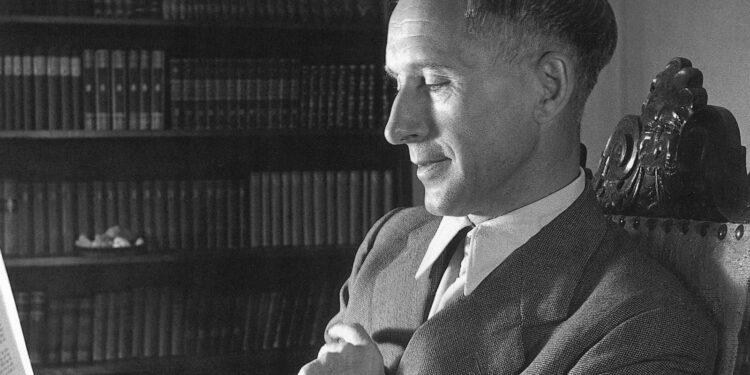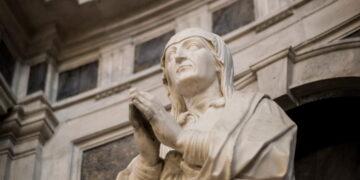Contents
Questo articolo è disponibile anche in:
Can individual otherness still exist in this globalized and conformist world for excellence? According to Ernst Jünger, the highly decorated German writer, philosopher and hero, this is not only still possible: it is an imperative. Through the work “Der Waldgang“, the German intends to encourage those men who still have within their soul the sacred flame that unites them to the red thread of the continuum of time.
Being the 1%
Germany, 1951. Europe emerged from the hell of the Second World War only six years ago and the rubble of the war was giving way to the new asphalt roads of the consumer society. A future of great economic development, with the specter of an looming clash with the Eastern Bloc, was beginning to be feared. It is in this scenario that Ernst Jünger wrote his “Der Waldgang“, in a defeated Germany now divided between the Americans and the Soviets. Far from being pleased with the rapid reconstruction made possible by the influx of American investments under the Marshall Plan, the German underlines the now unstoppable advance of liberal and Marxist nihilism.
The electoral practice is here bitterly contested as a banal automatism. For Jünger, the democratic legitimation of power has now been totally reversed in the 20th century. It is the power that imposes “the law on the voters, and not vice versa“. It could be argued that the author wants to emphasize the non-democratic nature of Western liberal parliamentarism, reduced to an impersonal and absolutely non-participatory mechanism unlike in classical Athens. Precisely by virtue of this illusory duty, Ernst Jünger intends to elevate the figure of those who act outside the confines imposed by electoral conformism.
He who has the courage to say no is the only one who prevents us from “being reduced to the state of termites“. This anomaly represents only 1 or 2% of the population for the author. He is the only one capable of truly opposing the third face of power; that is, the hegemon’s ability to create an institutional system that unconsciously forces the voter to legitimize and accept a system that initially benefits only power itself. That single no against the other ninety-nine yeses embodies freedom that prevails over necessity, courage of the individual against monotony of the multitude.

This strength ratio of one to one hundred is curiously necessary for the individual as a form of noble resistance as well as for power itself. In fact, this nonconformist is vital for the narrative and legitimation of the political regime which needs to create a “deviant enemy“, but numerically insignificant. This allows the power to legitimize itself since almost all the voters fall within the orthodox practice of the system.
At the same time, the small extremist minority is accused of being dangerous and extreme: it becomes the sworn enemy of the community. The position of that 1% is, therefore, fully condemned as criminal and harmful. The established power then proceeds to proclaim itself the defender of the majority, legitimizing its monopoly of force by virtue of the “common good” outlined by it: we see here the second face of power.
Becoming a Waldgänger
Being part of that small minority that falls outside of electoral orthodoxy is not enough to really be something for Jünger. We need to find the Waldgang, that is, the “passage to the forest”. Being a Waldgänger literally means being “one who passes through the forrest”. But what is this passage and what is meant by forest? The origin of this term dates back to medieval Iceland. The Waldgänger went into hiding voluntarily, by virtue of being an outlaw or an outcast. This action embodied the rebel’s desire to assert himself with his own strength alone.
In our time, this is an act of transfiguration, an elevation of the soul to a higher level of awareness by escaping the narrow paths pre-established by the current world. The Rebel is such because he chooses the “forrest” which is a place of refuge and inspiration. The individual is not attracted to the forest passively: he goes there voluntarily as an active subject. He is the individual who rediscovers his vital fire which cannot be quelled by contingency and contemporary technique. From being a “mere 1%”, he becomes something organic and self-sufficient.
The forest and nature have always had a privileged centrality in the imagination of human civilizations. It becomes the key place of the Rebel’s inner change by virtue of the atavistic connection between the human soul and nature. The Garden of Eden, the sacred groves of the Germans, the Greek water lilies, the medieval cloisters all originate from the episteme that saw man as an integral part of earthly forces from the very beginning. The forest is a symbol, which contains a plethora of essences and meanings. The forest is timeless: man takes refuge in it to draw renewed inspiration.

The man who considers himself a Waldgänger manages to penetrate the mesh of being: he is immune to the randomness of the present. He is a rebel ready to fight in the name of freedom, expressing a strong rejection of automatism and the suffocating security promised by Leviathan. The Rebel is immune to the fear widespread in current societies. Fear in the 1950s, as Jünger describes, took shape in the Eastern bloc, in the mutation of society, in the growth of technology. Anguish is therefore sovereign of everyday life, so that the terrified citizen becomes neurotically in need of subservience to what he is perceived as conformist.
The established power therefore offers its protection from anguish as long as it capitulates its freedom and organicity. The Rebel rejects being guided by anguish. He is fully master of himself, sovereign of his destiny. He takes refuge in the forrest when necessary, like a partisan in occupied territory, but he does not flee. He continues his fight relentlessly, knowing how to wisely change his position and tactics. It therefore becomes fundamental to use the tools made available by our time, without being dominated by them: “being in the world, but not of the world“, quoting Saint John.
Jünger is keen to underline how the path to freedom today is fraught with great constraints. It is not a happy path, however intrinsically right. The harshness of this path explains why most opt for coercion. Yet, history continues to be made by free men. Their sacrifice is Christic, since it also applies to everyone else. This moral force can, in fact, potentially awaken the dormant consciences of those who have renounced their own will and a meaningful existence. And it is precisely here that the first face of power acts, the most blatant and violent.
Terrified by the hypothesis of an Augustan inspiration, the Leviathan spasmodically tries to reduce the individual’s spaces of autonomy using technique and nihilism to limit as much as possible the emergence of other “no’s”, inspired by the Rebel. This manifestly explains the general massive deployment of increasingly complex and numerous police forces compared to previous centuries. The primordial anguish turns out to be, in reality, precisely that of power itself which does not want “the masks to fall”. And the more power is afraid, the more it uses its hard power.
To say it like Jünger:
“There are wolves hiding in the gray flock that is – characters who still know what freedom is. Moreover, these wolves are not only strong in themselves; there is also the danger that one fine morning they will transmit their characteristics to the masses, so that the flock turns into a pack. This is a ruler’s nightmare.”
All this inevitably leads the Rebel to overcome man’s ultimate fear: death. It is precisely on the fear for the latter that the arbiters and repressions are based. The moment man gets rid of the most atavistic of fears by “moving into the woods”, he becomes fully free. As Jünger points out, every authentic spiritual guide has always been reduced to this superior capacity. The winner of death par excellence is, not surprisingly, Christ himself who bears witness to His message with the acceptance and defeat of it.
It is evident how the great personalities of history who have transcended their eras to become timeless examples are often martyrs and heroes. Whether it was Socrates, Christ or a simple student like Jan Palach, the blood shed by them overturns the balance of power with power. As the fear of death disappears, power no longer has anything to leverage. His dominion is thus numbered.
That Italy that used to be a rebel
Jünger’s sharp pages dedicated to the theme of freedom and the figure of the Waldgänger have an even more current meaning in our world despite 73 years having passed since their publication. Indeed, great minds are always distinguished by their ability to enter into the ousia of reality, anticipating or grasping aspects that become apparent to most only later. If we intend to carry out an introspection on ourselves, as Europeans, Italians and Mediterraneans, we can perceive a familiarity with these Jungerian concepts.
If all of Europe was certainly the cradle of “individual originality“, the Mediterranean area was somewhat of an archetype of organized chaos. Italians have always had the matter of freedom very close to their hearts, of which the period of the communes also at times represented an extreme. But it was with knowledge that Italians distinguished themselves most, managing more than anyone else to delve into the depths of education. Just think of humanist culture, Dante’s works, Renaissance literature, the theology of Saint Thomas, the science of Fibonacci.
The current era, however, has flattened the vitality of Italians, who are now generally incapable of positioning themselves as a cultural and spiritual hotbed of European civilization. The Bel Paese has allowed itself to be immobilized by Jungerian fear and the illusion that all-encompassing security represents a “form of progress”. On the contrary, it is its death. And not only Italy, but all of Europe is chained in this hedonistic slumber which stands in complete antithesis to the rebel ideal described here. The 21st century embodies even more the hostile territory on which the Rebel will have to move.
However, all is not lost. A part of popular culture, what Gramsci would define as folklore, manages to offer somewhat a form of resistance to the suffocating homologation perpetrated by globalization. Even the action of various men of thought, far from the spotlight, keeps alive that mystery which is the soul of the people. However, the globalized world seems to have now almost reached the end of the line, at least in the shape in which we have known it so far. The global disorder in which we now find ourselves could potentially provide the perfect impetus to make that “passage to the forrest” and drink again from that source from which the purest essence of our civilization flows.
Stay up to date by following us on Telegram and Instagram!


















